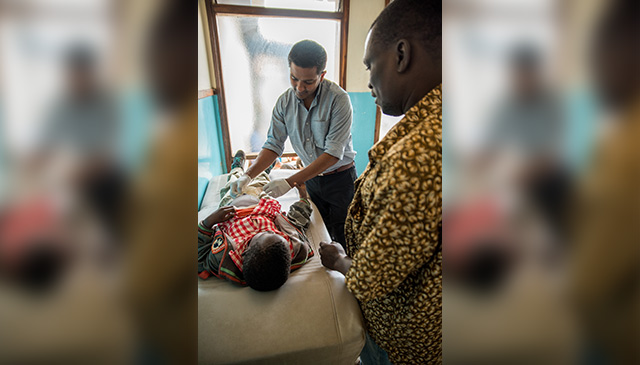
While Texas Children’s employees work locally to keep COVID-19 at bay, members of our system’s global health team are working just as hard to keep the disease from spreading in areas that are far more vulnerable to the pandemic.
“Low- and middle-income countries in places like Africa and Latin America are already stressed and strained with weak health systems and vulnerable populations,” said Dr. Heather Haq, Chief Medical Officer for the Baylor College of Medicine International Pediatric Aids Initiative (BIPAI) at Texas Children’s Hospital. “We will see devastating effects if COVID-19 becomes widespread in these areas.”
BIPAI at Texas Children’s Hospital is one of the largest global maternal and child health programs in the world with a presence across sub-Saharan Africa as well as Latin America and Romania. Our mission in these countries is the same as it is here in the United States – to care for sick children and women, and to educate more people to do the same.
Tremendous progress has been made in these communities over the years in the areas of HIV/AIDS cancer, tuberculosis, malaria, sickle cell disease and malnutrition; however much work needs to be done to ensure that COVID-19 does not undo these gains. Although the disease has yet to reach these areas in full force, it’s coming, and Texas Children’s and Baylor are standing ready to help fight its effects. Partnerships forged between Texas Children’s, government officials and local leaders are already helping forge a productive path forward in the face of this global crisis.
“We are extremely thankful for the continued commitment Texas Children’s and Baylor have to their global partners,” said Dr. Mogomotsi Matshaba, Executive Director of BIPAI’s operations in Botswana. “We need your expertise, guidance, moral support and financial assistance to get through this trying time.”
BIPAI at Texas Children’s Hospital is working around the clock to provide technical assistance and resources to help our global partners prepare for and respond to COVID-19 while maintaining access to essential services like continued access to antiretroviral therapy for people living with HIV. The BIPAI network holds daily calls to discuss strategies to protect the health care workforce, contain the spread of COVID-19, and continue to serve patients. In addition, they hold weekly video conferences focused on pertinent clinical information on COVID-19 and have established a COVID-19 resource library for global sites.
Texas Children’s and Baylor also are participating at national levels with local and regional leaders to shape policies aimed at curbing the impact of COVID-19 and protecting the work that’s already been done to strengthen their nations’ health care systems.
“It’s imperative we protect the gains we’ve made,” said Dr. Adeodata Kekitiinwa, BIPAI’s Executive Director in Uganda. “COVID-19 has the potential to wipe out years of work in areas where we are seeing significant gains.”
HIV/AIDS is one of the areas where great strides have been made. A setback such as the spread of COVID-19 – the effects of which are not yet known in people living with HIV – could be detrimental. In addition, children who need care for ailments such as malaria and malnutrition might not get the services they need if travel is restricted in countries or if resources are diverted to help those with COVID-19. Compounding the issue is that resources for critical care are already scarce in these areas. Uganda, for example, has only 55 ventilators for the entire country – that’s one ventilator per 1.3 million people. Other countries have even fewer.
“Unfortunately, the severe shortage of critical care means that many people in these settings who get sick with severe COVID-19 disease will die, until advances are made in treatments or a vaccine becomes available,” said Haq.
Phoebe Nyasulu, Executive Director of BIPAI’s operations in Malawi, said the severity of the situation means that COVID-19 has to be faced head-on and that it needs to be looked at from a global lens versus a country-by-country issue.
“With the help of BIPAI, Texas Children’s and Baylor College of Medicine, we are more confident we will be able to respond to COVID-19,” Nyasulu said. “We will get through this together.”

